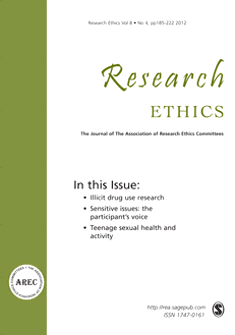
Research Ethics
Scope & Guideline
Navigating the Ethical Frontier of Research.
Introduction
Aims and Scopes
- Ethical Frameworks and Guidelines:
The journal focuses on the development, analysis, and application of ethical frameworks and guidelines for conducting research, ensuring that researchers adhere to principles of integrity and ethical responsibility. - Informed Consent Processes:
A significant area of emphasis is on improving informed consent processes, exploring how to ensure participants fully understand their involvement and the implications of research. - Vulnerable Populations:
The journal highlights ethical considerations when engaging vulnerable populations, including children, minorities, and individuals in crisis situations, ensuring their rights and welfare are prioritized. - Research Integrity and Misconduct:
Research integrity is a core focus, with discussions surrounding misconduct, including authorship disputes, data fabrication, and the pressures leading to unethical practices. - Interdisciplinary Ethical Considerations:
The journal promotes interdisciplinary discussions on ethics, addressing unique challenges that arise within different fields of research, such as social sciences, health, and AI. - Crisis Situations and Ethics:
There is a particular interest in how research ethics evolve during crises, such as pandemics or natural disasters, and how these situations impact ethical decision-making.
Trending and Emerging
- Dual Use Research:
There is a growing focus on the ethical implications of dual use research, especially in fields like artificial intelligence and biotechnology, where research can be used for both beneficial and harmful purposes. - Community Engagement and Participation:
Emerging themes emphasize the importance of community engagement and participatory research methods, particularly in understanding and addressing ethical issues in diverse cultural contexts. - Ethics in Crisis Research:
The journal is increasingly addressing research ethics in crisis situations, particularly in light of the COVID-19 pandemic, focusing on rapid response research and the ethical challenges it poses. - Digital and Online Research Ethics:
With the rise of digital technologies, there is an increasing emphasis on ethical considerations related to online data collection, social media recruitment, and privacy issues in digital research. - AI and Research Ethics:
The implications of artificial intelligence on research ethics are emerging as a critical theme, exploring both ethical dilemmas and the need for new ethical frameworks in AI research. - Global Collaboration and Ethics:
There is a notable trend towards examining the ethical dimensions of global research collaborations, particularly in resource-poor settings, emphasizing equity and justice in research practices.
Declining or Waning
- Animal Research Ethics:
There has been a noticeable reduction in the number of papers focusing on ethical considerations specifically related to animal research, possibly due to a broader focus on human-centered ethical dilemmas in recent years. - Traditional Ethical Review Processes:
Discussions around traditional institutional review board (IRB) processes have decreased, suggesting a shift towards more innovative and flexible approaches to ethical oversight in research. - Longitudinal Studies on Research Ethics:
There appears to be fewer longitudinal studies examining the evolution of research ethics over time, which may indicate a current preference for more immediate and context-specific ethical inquiries. - Ethics in Non-Academic Research:
The focus on ethics in non-academic or grassroots research has waned, possibly as the journal shifts towards more formalized and institutionalized research contexts. - Standardization of Ethical Guidelines:
The conversations surrounding the standardization of ethical guidelines across disciplines are less frequent, suggesting a move towards recognizing the need for context-specific ethical considerations.
Similar Journals
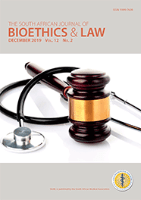
South African Journal of Bioethics and Law
Bridging the gap between ethical considerations and legal frameworks.South African Journal of Bioethics and Law, published by HEALTH & MEDICAL PUBLISHING GROUP, stands as a vital academic platform for discussions at the intersection of bioethics and legal studies. With an ISSN of 1999-7639, this journal has embraced an Open Access model since 2008, ensuring global accessibility for researchers, practitioners, and students alike. Based in South Africa, the journal operates from PRIVATE BAG X1, PINELANDS, CAPE TOWN 7430, and features diverse articles that span a multitude of pertinent topics across health professions, law, and public health. It proudly holds a Q3 ranking in Health Professions and Law sectors, affirming its status within the scholarly community. Notably, for the year 2023, it has achieved impressive placements in Scopus ranks, reinforcing its commitment to disseminating high-quality research and fostering dialogues that influence policy and practice in these critical domains. Researchers exploring the intricate ethical and legal dimensions of healthcare will find this journal an indispensable resource.

Journal of Academic Ethics
Illuminating the Intersection of Ethics and ScholarshipThe Journal of Academic Ethics, published by Springer, is a premier scholarly outlet dedicated to the exploration and analysis of ethical considerations across various disciplines, including philosophy, education, sociology, and the broader arts and humanities. With an ISSN of 1570-1727 and E-ISSN of 1572-8544, this journal has established itself as a vital resource since its inception in 2005, continuing to provide insightful contributions through 2024. Recognized for its impactful research, it holds esteemed positions in multiple Scopus categories, including a Q1 ranking in both Arts and Humanities (Philosophy) and a Q2 ranking in Education and Sociology. This highlights the journal's significance in fostering ethical discourse among researchers and practitioners alike. Although it does not currently offer open access, the journal's robust academic framework ensures high-quality contributions that advance knowledge and promote critical discussions about ethical practices in academia and beyond. For anyone engaged in ethical inquiries, the Journal of Academic Ethics serves as an indispensable platform for innovative research and scholarly dialogue.
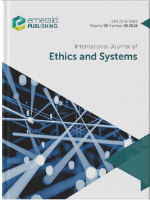
International Journal of Ethics and Systems
Fostering Critical Dialogue on Ethics and Systems.International Journal of Ethics and Systems is a pioneering publication within the realm of ethics and systems, dedicated to the exploration of complex ethical frameworks and their applications across various domains, especially in economics and philosophy. Published by Emerald Group Publishing Ltd, this journal stands out with an impressive impact factor and robust rankings; it is classified within the Q1 quartile for Philosophy and Q3 for Economics and Econometrics in 2023, showcasing its interdisciplinary significance. With a wide readership scope and an exceptional Scopus ranking—32nd out of 806 in Philosophy—this journal serves as an essential resource for researchers, professionals, and students eager to engage with contemporary debates and innovative approaches in ethical theory and systemic analyses. Although it currently does not offer Open Access, the journal is readily accessible for those affiliated with institutions providing library subscriptions, reflecting its commitment to facilitate high-quality scholarly discourse. The journal's convergence period from 2018 to 2024 highlights its ongoing relevance and responsiveness to emerging trends in ethical inquiry.
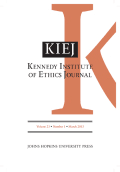
KENNEDY INSTITUTE OF ETHICS JOURNAL
Cultivating Critical Thought in Ethics and Health PolicyThe KENNEDY INSTITUTE OF ETHICS JOURNAL, published by the prestigious Johns Hopkins University Press, stands as a leading periodical in the realm of ethics, particularly emphasizing the intersection of health policy, social sciences, history, and philosophy of science. With an ISSN of 1054-6863 and an E-ISSN of 1086-3249, this journal has been a cornerstone of ethical discourse since its inception in 1991. Renowned for its rigorous peer-review process, the journal boasts impressive rankings, including Q1 in History and Philosophy of Science and Q2 in Health (Social Science) for 2023. Researchers, professionals, and students alike will find this journal invaluable for navigating complex ethical issues, providing a platform for innovative research and discourse. Although currently not offering Open Access, its contributions to the fields of ethics and legal aspects of health are profound, making it an essential resource for those engaged in these critical discussions.

JOURNAL OF BUSINESS ETHICS
Elevating the discourse on business ethics and social responsibility.JOURNAL OF BUSINESS ETHICS is a premier scholarly journal published by Springer, dedicated to the exploration of ethical issues in business practices and corporate governance. With an impressive impact factor placing it in the Q1 quartile across multiple disciplines including Arts and Humanities, Business Management, and Law, this journal plays a critical role in advancing discussions around ethical decision-making and social responsibility in the corporate world. Since its inception in 1982, the journal has been a vital resource for researchers, professionals, and students, providing a platform for high-quality interdisciplinary research that drives ethical standards in business. The JOURNAL OF BUSINESS ETHICS boasts high rankings in Scopus metrics, including a remarkable 99th percentile ranking in Social Sciences and Law, underscoring its influence and reach within the academic community. The journal is historically published in the Netherlands and is renowned for its commitment to rigorous research methodologies and impactful insights. Through its comprehensive approach, it aims not only to illuminate pressing ethical dilemmas but also to foster a dialogue among stakeholders about sustainable business practices.
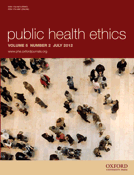
Public Health Ethics
Addressing Urgent Ethical Dilemmas in Health PolicyPublic Health Ethics is a key journal published by Oxford University Press, dedicated to the intersection of public health, ethics, and policy. With an ISSN of 1754-9973 and an E-ISSN of 1754-9981, this journal has been a vital resource since its inception in 2009 and continues to contribute to the discourse until 2024. As a Q3 journal, it holds ranks of #17/46 in 'Nursing - Issues, Ethics and Legal Aspects' and #146/310 in 'Medicine - Health Policy' according to Scopus, reflecting its significance within the research community. The journal aims to address urgent questions and ethical dilemmas faced in public health practice and policy, making it essential reading for researchers, professionals, and students interested in health policy, ethics, and legal implications impacting public health. The absence of open access underlines the journal’s commitment to maintaining high standards of peer-reviewed research, encouraging rigorous scholarship that fosters innovative solutions to pressing public health challenges.
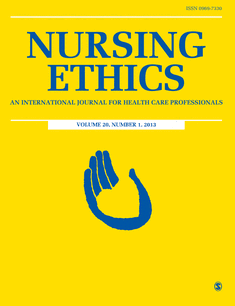
NURSING ETHICS
Championing Integrity in Nursing PracticeNURSING ETHICS, published by SAGE PUBLICATIONS LTD, is a premier international journal dedicated to the exploration and examination of ethical issues within the field of nursing. Since its inception in 1994, the journal has consistently provided a critical platform for scholars and practitioners to discuss ethical dilemmas and address complex legal aspects affecting nursing practice. With a remarkable Q1 ranking in the categories of Issues, Ethics, and Legal Aspects, it ranks in the top percentile, boasting a 92nd percentile position among its peers. Although currently not an Open Access journal, NURSING ETHICS plays a crucial role in fostering dialogue and advancing knowledge in the rapidly evolving landscape of nursing ethics, making it an invaluable resource for researchers, professionals, and students alike. The journal's commitment to high-quality research ensures that vital ethical considerations remain at the forefront of nursing education and practice, reinforcing its significance in a field that is continually impacted by ethical challenges.
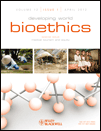
Developing World Bioethics
Fostering dialogue on health ethics for a better tomorrow.Developing World Bioethics, published by WILEY, is an esteemed journal dedicated to the exploration and advancement of ethical issues in health and healthcare within developing countries. Since its inception in 2001, this journal has become a critical platform for disseminating scholarly research and discourse that address complex bioethical challenges in varied socio-economic contexts. With an impressive Q2 ranking in multiple categories, including Health Policy and Issues, Ethics and Legal Aspects, it stands out as a vital resource among its peers, boasting significant Scopus rankings that highlight its influence and contribution to the fields of health and social sciences. The journal is committed to fostering interdisciplinary dialogue and insight, making it an invaluable asset for researchers, professionals, and students keen on bioethics and health policy. While the journal operates on a subscription basis, it provides broad access to its diverse range of articles, ensuring that cutting-edge bioethical perspectives are available to stakeholders worldwide, with a focus on innovative solutions and best practices in healthcare systems globally.
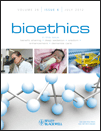
BIOETHICS
Championing Innovative Research in Bioethics for a Better Tomorrow.BIOETHICS is a leading academic journal published by Wiley, dedicated to exploring the multifaceted issues at the intersection of healthcare, philosophy, and policy. With an ISSN of 0269-9702 and an E-ISSN of 1467-8519, it has established itself as a critical platform for scholarly discourse since its inception in 1987. The journal holds impressive rankings, featuring in the Q1 category in both Health (social science) and Philosophy, alongside a Q2 rating in Health Policy for 2023. This positions BIOETHICS in the top echelons of its fields, ranking 35th out of 806 in Philosophy and garnering high percentiles across relevant disciplines. By fostering a deeper understanding of ethical implications in medical and social contexts, BIOETHICS serves as an essential resource for researchers, professionals, and students committed to addressing contemporary challenges in health and policy. The journal is accessible through institutional subscriptions and offers an engaging platform for the dissemination of significant research findings and theoretical advancements, paving the way for future exploration in bioethical inquiry.

Cuadernos de Bioetica
Exploring the Ethical Frontiers of MedicineCuadernos de Bioetica, published by the ASOC ESPANOLA BIOETICA & ETICA MEDICA, is a prominent academic journal dedicated to exploring significant philosophical, ethical, and legal dimensions within the field of bioethics. With an ISSN of 1132-1989 and an E-ISSN of 2386-3773, this journal serves as a vital platform for researchers, professionals, and students in medicine and related disciplines. Since its inception in 2008, it has consistently provided critical analyses and discussions reflecting the evolving landscape of healthcare ethics, contributing notably to the discourse surrounding ethical practices in medicine. Despite its current Q4 ranking in the miscellaneous medicine category, Cuadernos de Bioetica is committed to enhancing its impact and relevance, making it an essential resource for those seeking to navigate the complex ethical challenges in contemporary medical practice. The journal’s reach is underscored by its commitment to fostering open dialogue among diverse stakeholders in the field, encouraging a broad spectrum of contributions to advance knowledge in bioethics.